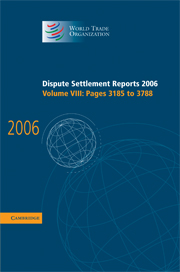European Communities – Measures Affecting the Approval and Marketing of Biotech Products (WT/DS291, WT/DS292, WT/DS293): Table of Annexes I-3 to K
Published online by Cambridge University Press: 12 December 2017
Summary
COMMENT ON REPLIES TO QUESTIONS BY DR. ANDOW
Question 3
On the basis of the information before the Panel, is there any scientific evidence to support the hypothesis that wide-spread cultivation of Bt crops such as biotech maize of the Bt variety adversely affects non-target organisms which may be exposed to such crops under typical agricultural practice? (See, inter alia, EC-149, EC-150, EC-151, EC-152) If so, how does this risk compare with risks to non-target organisms arising from non-biotech applications for Bt toxins (i.e., the use of Bt toxin as an insecticide in conventional and organic farming)? What risk management options are available to mitigate any resulting risks and what is their efficacy?
Scientific evidence
03.01. In the answer to this question, I will concentrate on Bt maize and Bt cotton. Yes. there is some scientific evidence to support the hypothesis that wide-spread cultivation of Bt crops adversely affects non-target organisms which may be exposed to such crops under typical agricultural practice. However, this evidence is insufficient to establish the hypothesis that such adverse effects are expected to occur.
Comments by Argentina
This statement starts mentioning that there is “some (sic) scientific evidence to support the hypothesis”…, of non-target effects on organisms, “which may be exposed”, and ends that “this evidence (sic) is insufficient to establish the hypothesis that such adverse are expected to occur”. It is clear from this wording that there is no solid evidence to support the fact that the organisms will actually be exposed in a way which may be of concern about the safety of the Bt crops mentioned.
03.02. The review of non-target effects of Bt plants in EC-149 covered 13 laboratory studies evaluating potential hazard, and 14 field studies aimed at evaluating potential risk. Of the 13 lab studies reviewed, I conclude that five studies did not expose the test organisms properly and therefore are irrelevant hazard evaluations (an organism must be exposed to evaluate hazard). In two additional studies, four of eight test species were not properly exposed. Of the remaining, seven species were studied.
- Type
- Chapter
- Information
- Dispute Settlement Reports 2006 , pp. 3187 - 3788Publisher: Cambridge University PressPrint publication year: 2008
- 2
- Cited by



